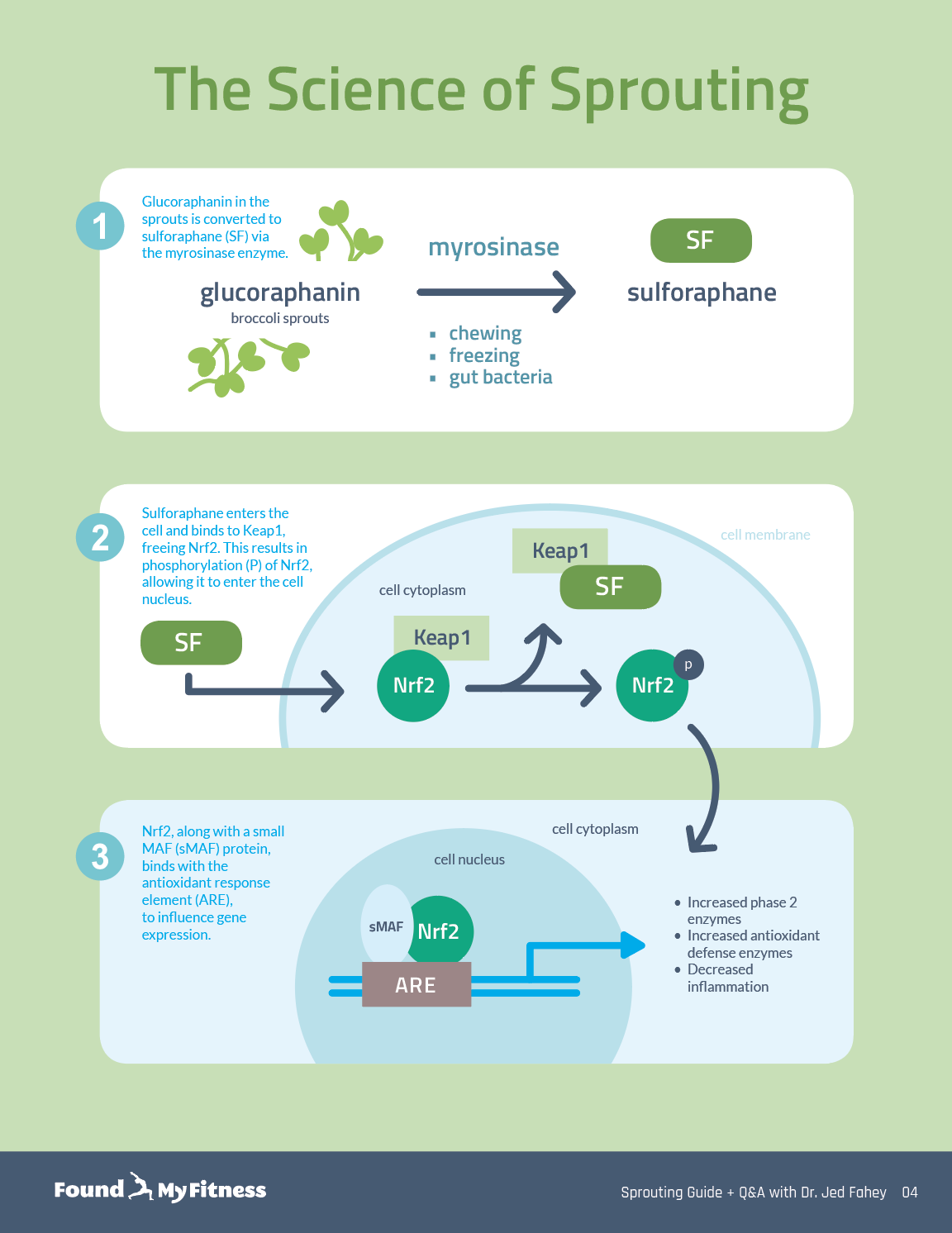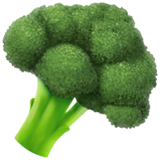Which supplements are reliable sources of sulforaphane? | Jed Fahey
Enter your email to get our 15-page guide to sprouting broccoli and learn about the science of chemoprotective compount sulforaphane.
Broccoli sprouts are concentrated sources of sulforaphane, a type of isothiocyanate. Damaging broccoli sprouts – when chewing, chopping, or freezing – triggers an enzymatic reaction in the tiny plants that produces sulforaphane.

Get the full length version of this episode as a podcast.
This episode will make a great companion for a long drive.
Identifying a reliable source of sulforaphane presents many challenges. Choosing a supplement that contains both glucoraphanin (the precursor to sulforaphane), as well as myrosinase (the enzyme that converts glucoraphanin to sulforaphane), is crucial to ensuring optimal sulforaphane delivery. A few reliable supplement manufacturers use reliably sourced broccoli seed extract to obtain the glucoraphanin for their products. In this clip, Dr. Jed Fahey names several reliable supplemental sources of sulforaphane.
• Prostaphane® • Crucera SGS® (Thorne) • Oncoplex® (Xymogen) • Avmacol® • Vision Defense® (Swanson) • MaxN-Fuze® • MitoCORE® (Ortho Molecular Products)
Other companies/entities named: • Brassica Protection Products • Kuli Kuli moringa powder • Cullman Chemoprotection Center
[Dr. Patrick]: The question is, "What brands of sulforaphane supplements do you consider reliable?"
[Dr. Fahey]: Okay, the story there requires, again, I've given it to you, my disclosure. I started a company with my mentor and his son, and the company is still being run, Brassica Protection Products, and they make broccoli seed extract that go into a variety of supplements. I know that. And I also, based on my, you know, grandfatherly love of the company, which, you know, I'm trying to help do good things now that I've retired, I know that the vendors or the supplement makers that they sell their stuff to by and large do a good job and make good products. And my lab, before I retired, has tested many of those products and found that, you know, if they say they have X milligrams of glucoraphanin in their product, yeah, they've got at least that in there, and so they're good supplements.
As I mentioned, there are a lot of supplements that are pure crap that don't have what they say they have. And fortunately... Well, I'm not aware of any of those that are... Well, I shouldn't say that. I am aware of some of them that are widely sold and probably people are taking. But I can...
So I've commented on brands that I would know...that I know and that I would trust on our website, www.chemoprotectioncenter.org. They're in the FAQs of that website. And, you know, specifically... And I can provide links, but they're easy to find. I know that Crucera-SGS by Thorne is good, has what it says it has. OncoPLEX, which is made by a company called Xymogen. Avmacol, which is made by Nutramax. Swanson has a Vision Defense product that's decent. Ortho Molecular has something called MitoCORE. Max International has something called Max N-Fuze which is a drink, I believe. Yeah, it is.
So, I mean, these are mostly gelcaps, tablets. The first two that I mentioned are gelcaps, the Avmacol is a tablet. Vision Defense I can't remember, but it's a supplement for eye health, so it's go other things in it.
So these are all good. I'm not endorsing them in the sense that, you know, I'm not associated with any of those companies, but I've talked to some of them, I've used some of their products in clinical studies that we've published, or that we're getting ready to publish. I would stick with a supplement that someone like me says decent things about. And I only say that because if you take some of the shoddier supplements, you may wind up just making expensive urine. Meaning, you know, you'll spend $30 or $40 or $50 or $60 for a bottle and, yeah, you'll not get the benefits that you hope for.
[Dr. Patrick]: Just to follow up on that. I know, of the supplements that you mentioned, that Avmacol has stabilized sulforaphane in it. Do any of the other supplements, or are they just all glucoraphanin?
[Dr. Fahey]: No, it doesn't, actually. That's not...
[Dr. Patrick]: Oh, it doesn't. Stabilized myrosinase.
[Dr. Fahey]: Right. So Avmacol has glucoraphanin in it and it has myrosinase. I think all of those companies are going to move towards adding myrosinase to their mixes, but I, of course, don't know that. You know, I think they're all decent products and we've done trials with Thorne's Crucera, with Xymogen's OncoPLEX, with Nutramax's Avmacol. Some of the... There are a lot of clinical...there are a number of clinical studies that are going to be coming out or are in press using Avmacol with autism and schizophrenia. But it's not to say that those are the best supplements. I think they're decent supplements and they have active myrosinase, that's true.
I think getting...you know, we talked about this when we talked about dosing, but we probably didn't talk about it enough. Your listeners should know that, you know, if you're counting on your gut's...your intestinal tract's myrosinase to do all of the conversion for a supplement, you're probably going to want to take a higher level of glucoraphanin. And if you're getting a product that has myrosinase in it, you don't need as much glucoraphanin because some of that conversion is theoretically going to happen based on what you've provided in the supplement tablet.
If you were supplementing with sulforaphane, and I know there are a number of questions about this, with stabilized sulforaphane, so let me jump ahead to that.
[Dr. Patrick]: Like Prostaphane, does Prostaphane have stabilized sulforaphane?
[Dr. Fahey]: Prostaphane is the only product that I know that reliably has what they say they have of sulforaphane, the amount they say they have. And it is stable. But it's a European product, it's a French product. I think it's fair to say that it's difficult, it's very difficult in fact, to get it in this country, to buy it. And, you know, because it is a European product, our...it doesn't fall under the purview of our FDA. So, you know, you can say all the nasty stuff you want about our regulators and about our FDA, and there are plenty of negative things that have been said about them, but they do have some oversight capacity. And although they don't do a good job of...based on the law that governs them, they don't do much in terms of regulating quality of dietary supplements, at least they have some power over the industry.
So, you know, I wish there was more stabilized sulforaphane, various people are working on it. We've done some... There's a company in England that has something that's nonnatural, a synthetic sulforaphane that they've stabilized. We've actually done some experiments with that type of sulforaphane and found that there are some adverse side effects, so I certainly wouldn't recommend that.
So yeah, it's a work in progress, again. And companies and universities are looking to ways to stabilize sulforaphane. It's a very unstable molecule inherently, which is one of the reasons why it does what it does in your body. So it's difficult to deliver, it's difficult to stabilize, which is why the pant, you know, focuses on storing glucoraphanin, and then it converts it when it needs it. Because, after all, it's a defensive plant chemical. And we, when we take supplements, I think, are well-advised to take glucoraphanin and myrosinase, unless and until someone does a better job of stabilizing sulforaphane itself.
A developmental disorder characterized by impaired social interaction, behavioral problems, and poor communication. Autism typically manifests in early childhood and is slightly more common among boys than girls. In clinical trials, sulforaphane, a compound derived from broccoli and broccoli sprouts, reduces the characteristic behaviors associated with autism.
A glucosinolate (see definition) found in certain cruciferous vegetables, including broccoli, Brussels sprouts, and mustard. Glucoraphanin is hydrolyzed by the enzyme myrosinase to produce sulforaphane, an isothiocyanate compound that has many beneficial health effects in humans.
An essential mineral present in many foods. Iron participates in many physiological functions and is a critical component of hemoglobin. Iron deficiency can cause anemia, fatigue, shortness of breath, and heart arrhythmias.
A chemical that causes Parkinson's disease-like symptoms. MPTP undergoes enzymatic modification in the brain to form MPP+, a neurotoxic compound that interrupts the electron transport system of dopaminergic neurons. MPTP is chemically related to rotenone and paraquat, pesticides that can produce parkinsonian features in animals.
A family of enzymes whose sole known substrates are glucosinolates. Myrosinase is located in specialized cells within the leaves, stems, and flowers of cruciferous plants. When the plant is damaged by insects or eaten by humans, the myrosinase is released and subsequently hydrolyzes nearby glucosinolate compounds to form isothiocyanates (see definition), which demonstrate many beneficial health effects in humans. Microbes in the human gut also produce myrosinase and can convert non-hydrolyzed glucosinolates to isothiocyanates.
A mental disorder characterized by abnormal social behavior and failure to understand what is real. Common symptoms include false beliefs, unclear or confused thinking, hearing voices that others do not, reduced social engagement and emotional expression, and a lack of motivation. People with schizophrenia often have additional mental health problems such as anxiety disorders, major depressive illness, or substance use disorders.
An isothiocyanate compound derived from cruciferous vegetables such as broccoli, cauliflower, and mustard. Sulforaphane is produced when the plant is damaged when attacked by insects or eaten by humans. It activates cytoprotective mechanisms within cells in a hormetic-type response. Sulforaphane has demonstrated beneficial effects against several chronic health conditions, including autism, cancer, cardiovascular disease, diabetes, and others.
Hear new content from Rhonda on The Aliquot, our member's only podcast

Listen in on our regularly curated interview segments called "Aliquots" released every week on our premium podcast The Aliquot. Aliquots come in two flavors: features and mashups.
- Hours of deep dive on topics like fasting, sauna, child development surfaced from our enormous collection of members-only Q&A episodes.
- Important conversational highlights from our interviews with extra commentary and value. Short but salient.
Sulforaphane News
- Broccoli seed extract with a sulforaphane precursor reduced common cold symptom days in healthy adults.
- Sulforaphane-rich broccoli sprout extract modestly lowers fasting blood sugar in some people with prediabetes, perhaps due to variations in gut microbiota and individual metabolic traits.
- Sulforaphane, derived from broccoli, activates Nrf2, mitigating age-related skin changes and boosting the antioxidant defense system in mice.
- Sulforaphane from broccoli sprouts shows promise in preventing Alzheimer's disease – boosting memory and enhancing mitochondrial function in mice.
- Breathwork enhances endogenous antioxidant enzyme activity to counter oxidative stress.






